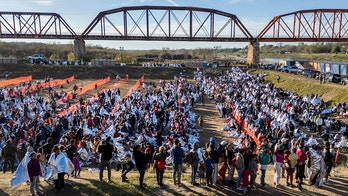Veterans exposed to burn pits push for health benefits
Attorney Brian Lawler and Le Roy Torres, co-founder of Burn Pits 360 Veterans Organization, discuss suing former employer on 'Fox News @ Night.'
U.S. Army veteran and former Texas state trooper Le Roy Torres is seeking justice and is hoping the Supreme Court will provide it.
On Tuesday, the highest judicial bench in the U.S. is set to hear the case of Torres, an Army reservist who claims he was forced to resign from his post as a state trooper with the Texas Department of Public Safety (DPS). Torres claims that his ouster came after experiencing the effects of extensive lung damage he developed after his exposure to burn pits while serving as a U.S. army reservist in Balad, Iraq. His case of wrongful termination has been stalled in the Texas courts since 2017. Torres is hopeful that the Supreme Court will rule in his favor.
"The motivation is for justice," Torres said in an interview with Fox News. "I know in my mind and heart that I did everything possible to follow the guidance and procedure for when we return from war or deployment with the ailments we have."
"You serve and return back to be pushed out in the cold. That’s what was devastating to me," the Iraq War veteran said.
Torres first filed a lawsuit against the DPS and the state of Texas back in February 2017, claiming that his worker rights under the Uniformed Services and Employment and Reemployment Rights Act of 1994 (USERRA), a federal statute that strengthens job protections for service members.
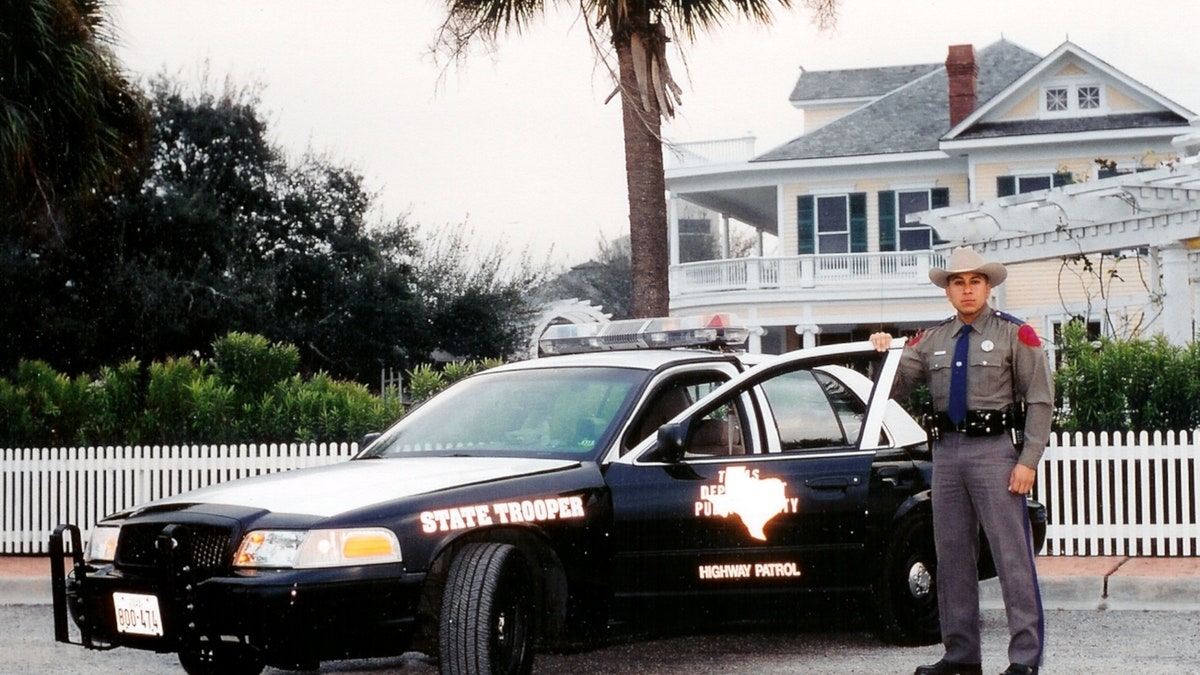
Le Roy Torres says he was effectively ousted from his state trooper position by the Texas Department of Public Safety when his medical condition from burn pit exposure made him unable to fulfill patrol duties. (Courtesy of Le Roy and Rosie Torres)
The state countered his claims and argued in court that Texas had sovereign immunity from lawsuits like Torres'.
The judge presiding over the original complaint denied the state’s motion, but it was upheld by the Texas Court of Appeals, stating that USERRA was unconstitutional due to how it authorizes suits filed against individual states.
"Permitting state employers to discriminate against soldiers for their military service will materially interfere with the ability of the United States to provide for the national defense," a brief file by Torres’ legal team read. "It will also harm thousands of veterans and service members, leaving them without a remedy when their state employers discriminate against them on the basis of their service."
San Diego-based veterans’ rights attorney Brian J. Lawler said if the Supreme Court rules in Torres’ favor and his trial is allowed to go forward in the Texas Court system, it will set a precedent that will prompt sweeping reform.
"If they do rule in our favor, it will be a leveling of the playing field," Lawler said to Fox News. "It will absolutely set precedent for every reserve or guard person who is employed by a state employer. Right now, many of those individuals have the right to sue their state employers, but many still don't. And that's not what the USERRA law states."
An official with the Texas Department of Public Safety declined to comment, saying, "The department does not discuss pending litigation."
VETERANS GROUP HELPS UKRAINE EVACUATIONS AMID RUSSIA'S WAR
Torres was called up for duty from the reserves in 2007 while serving as a trooper in the Lone Star State. It was during that time that he was exposed to burn pits at his base in Balad. The pits were often used across many U.S. military bases across Iraq and Afghanistan during the wars as a crude method of incineration in which every piece of waste generated on the base was burned, including plastics, batteries, appliances, medicine, dead animals and even human waste.
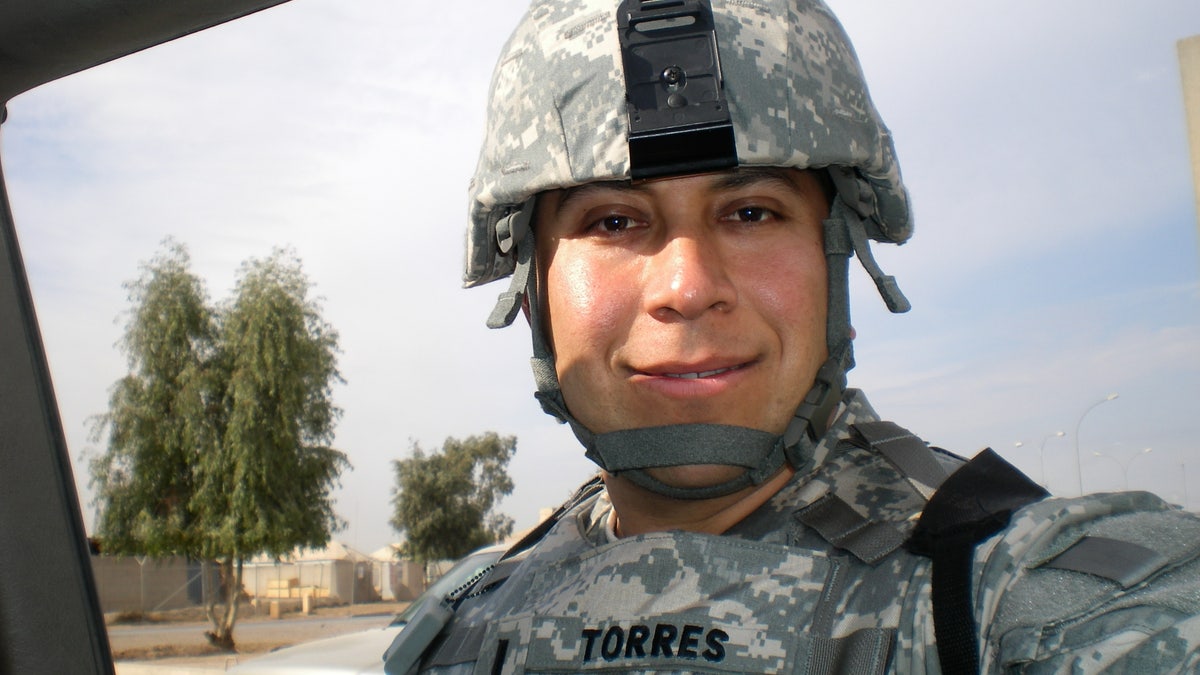
Torres was stationed at a base in Balad during the Iraq War.
The items were often set ablaze with jet fuel as the accelerant with over 1,000 different chemical compounds burning into the air day and night.
Torres returned home to Texas in 2007 and resumed his duty as a state trooper a year later, after an honorable discharge from military service. It was around that time that he also started feeling the effects of his burn pit exposure.
"Throughout my time after coming back, I was already having issues," he said. "But there was a lot of things that I wouldn't tell my wife because the last thing I want to do was to lose my job. So a lot of times I just, you know, as I say in the army, suck it up and drive on, and that's what I did."
Torres added that’s when he started waking up with debilitating headaches that often lasted throughout the day.
"There were times where I had to pull over on the side of the road," he said. "I'd sit there for five or 10 minutes with my head leaned back because I was in excruciating pain."
Torres dealt with his issues for nearly a year-and-a-half.
"He was having issues, and he was not telling me. So it was something that, you know, I wasn't paying attention to because I was busy working. He was working," Torres’ wife, Rosie, also a long-time veteran advocate who started Burn Pits 360 with her husband, said to Fox News. "Then weird things start to happen. And then at work, I think his symptoms became more obvious. So much so that we ended up in that position where you could not ignore his cough because it sounded like he was a going to cough up a lung in the process."
It was while he was chasing a suspect during the summer of 2009 that Torres realized that something was truly wrong with his health. "I was in a lot of pain with chest pressure. I was afraid that I was having a stroke and I had no backup until like 10 minutes later. I felt really horrible that day, and that's when I knew that there was something going on. And that's when I started kind of talking to my wife about it."
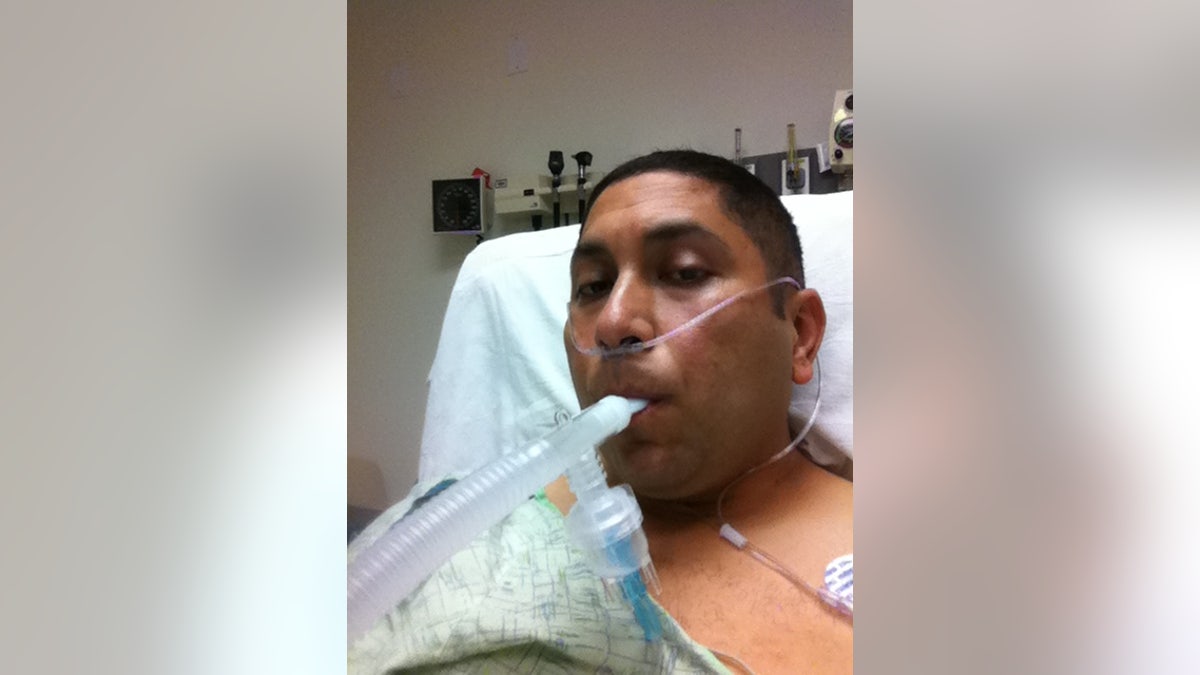
The Iraq War veteran developed a host of lung issues as well as toxic brain injury after returning home from service.
The trooper started calling out sick, unable to perform his patrol duties. Torres was experiencing a myriad of symptoms including debilitating headaches, vertigo and a persistent, unforgiving cough.
"I was already missing a lot of work and my sergeant walked in August 2010 one morning and said, ‘Hey, you can't come back to work,’" he said, "you need to get checked. There's something definitely wrong with you. We don't know if you're contagious… different things like that."
He went on, "That's what led into the journey, into seeking answers."
TUSKEGEE AIRMAN HONORED FOR WIN IGNORED DURING HIS SERVICE
At the time that Torres started developing his symptoms, the effects of burn pit exposure were not widely known. Doctors at his local VA hospital chalked up his symptoms to asthma.
With the feeling that his developing illnesses were something more serious, Torres went to see pulmonologist Dr. Robert Miller at Vanderbilt University Hospital in Nashville, Tennessee. It was then that he learned that his exposure to those burn pits at his base in Balad had led to toxic brain injury and several lung ailments, including constrictive bronchiolitis, a severe and chronic respiratory condition that causes narrowing of the airways.
Once diagnosed, Torres said that he returned to his commanding officers at DPS and informed them that he wanted to return to work but that due to his condition he could no longer go on patrol and requested accommodations for a desk job. The trooper said he was denied his request and was offered his original position and told that he would be fired if he could not perform his duties.
"I was handed a memorandum saying I could not be employed as a state trooper. Then they retract that memo and say, well, until further notice, you'll be placed on a modified duty," Torres said. "But eventually they just, after I didn't hear back, and I kept asking my supervisor, but I never got an answer. Eventually, I was forced to resign."
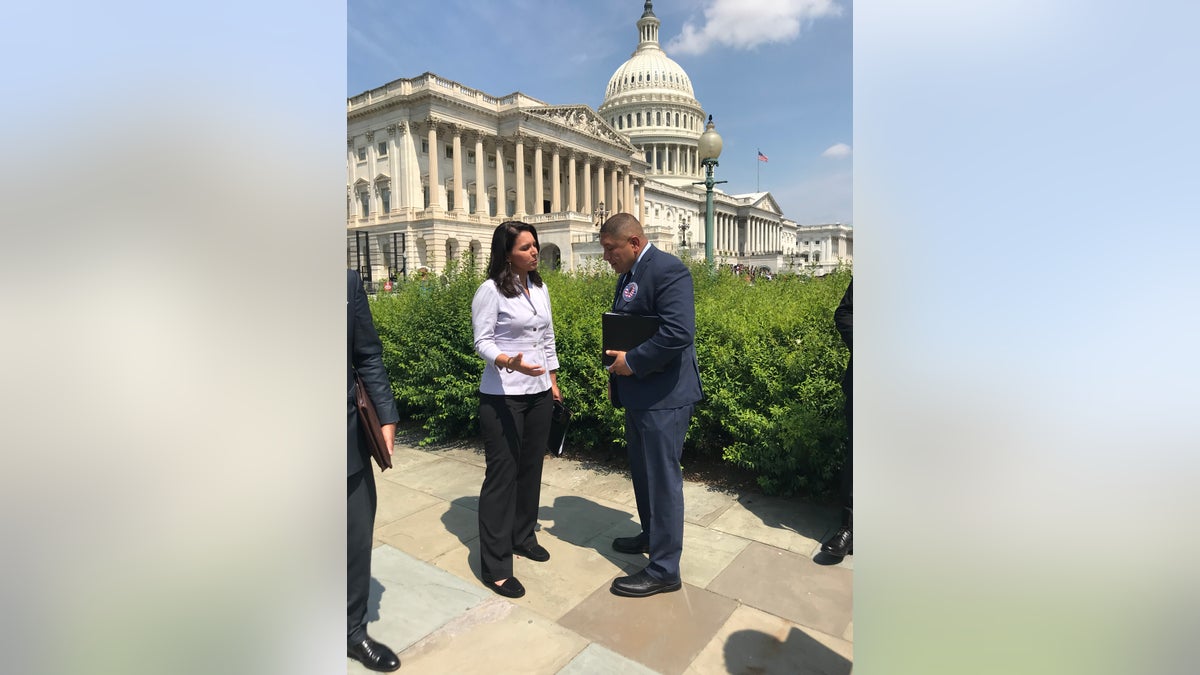
Torres, seen here with former Rep. Tulsi Gabbard at a 2018 news conference on Capitol Hill, has also been lobbying for veterans who were denied care by the VA for their burn pit exposure.
"[It was] the only way that I could apply for my medical disability," he added. "I was already off the payroll, and we were in dire need of finances. We almost lost our house. Our credit was shot. I had no other choice."
With the stress of losing everything, Torres felt he had failed at supporting his family and in the summer of 2009 he attempted to take his own life. His wife and his service dog, Hope, were able to knock his shotgun to the ground.
"That night that he took the shotgun and put it in his mouth," Rosie Torres recalled. "I fought him with everything I had in me. I was screaming for our service dog, ‘Hope, I need you to help me!’"
She continued, "I was thinking in my mind, this is not how it ends. They don’t get to win."
Both Le Roy and Rosie were able to soldier on as they committed to not only helping other veterans who were not given adequate health care from the VA for their burn pit exposure but has also continued their fight against the state of Texas for what he claims was being pushed out of the career he had worked towards his whole life. He’s hopeful that the Supreme Court will rule in his favor at today’s hearing.
CLICK HERE TO GET THE FOX NEWS APP
"It was definitely a feeling of the wheels of justice finally starting to turn," he said, recalling when he first received word that the Supreme Court would be hearing his case.
"I'm hopeful that it's going to move forward. I can only think that it's going to get better."











































